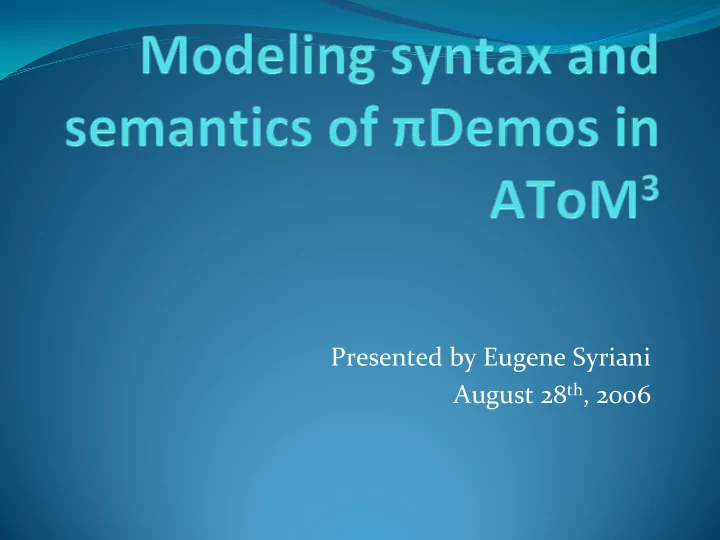

Presented by Eugene Syriani August 28 th , 2006
Overview π Demos, the article Context Structure Modeling the syntax: The Meta-Model Modified structure Time Modeling the semantics: Graph Grammars Rules Words in action…
Introduction G. Birtwistle: Calgary, Canada C. Tofts: Swansea, Wales Operational semantics of process-oriented simulation languages – Part 1: π Demos, 1993
What is π Demos? π Demos Demos is a small process-oriented discrete event simulation language. It is a TEXTUAL language π Demos Demos operational semantics enables a complete control on Synchronization Event-list scheduling Inter-process communication
πDemos’ structure Process vs Resource
πDemos’ structure Process vs Resource
That’s all nice, but…
We want to model the syntax and semantics of π Demos
First, a Meta-Model “Everything is a model” Rules / Actions are Blocks UML class diagram Block Generator Get Hold Put End
First, a Meta-Model “Everything is a model” Resource and transaction UML class diagram Resource Transaction
First, a Meta-Model “Everything is a model” Time UML class diagram Time Head Tail State Current
The Meta-Model
Using AToM 3 The big picture
Using AToM 3 When QOCA is involved
Using AToM 3 The Meta Model A model
Now, let’s give a meaning to the meta-model Define a Graph Grammar 15 graph transformations are sufficient AToM 3 is a very nice and easy tool to use for graph transformations
Example: EXIT Define the LHS by means of labels on each On the RHS, specify what it should be item of a subgraph of a model instance. replaced by
Using AToM 3
Further work Enable loops in processes, with conditions Non-determinism is possible Closer to reality Proof of termination is NP-Complete Let the process really do something, not just halt Problem: time is not known in advance
Recommend
More recommend